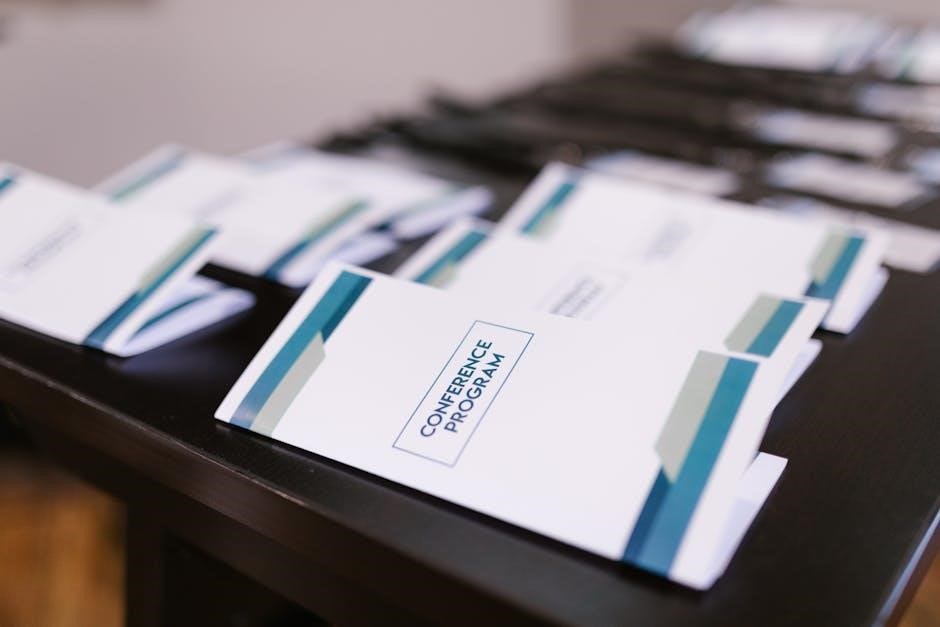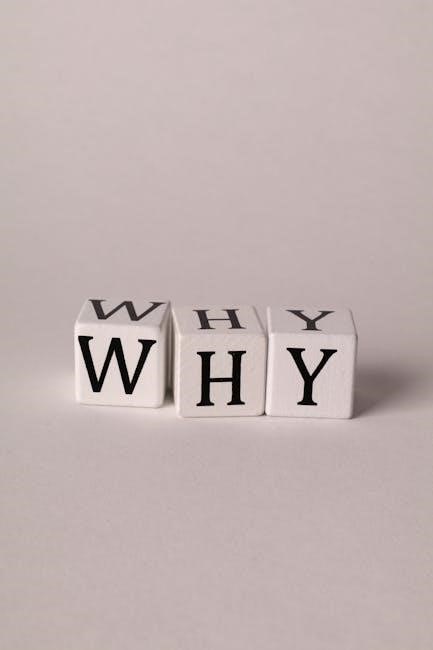Welcome to “The Odyssey Questions and Answers PDF”, a comprehensive study resource designed to enhance your understanding of Homer’s epic poem. This guide offers detailed insights, character analysis, and study prompts to deepen your exploration of Odysseus’s journey, themes, and cultural significance.
Overview of “The Odyssey” and Its Significance
“The Odyssey” is an ancient Greek epic poem attributed to Homer, chronicling Odysseus’sjourney home after the Trojan War. This foundational text explores themes of perseverance, loyalty, and fate, making it a cornerstone of Western literature. Its rich narrative and universal themes continue to resonate, influencing art, literature, and culture for millennia. The poem’s exploration of human nature, divine intervention, and moral dilemmas remains timeless, offering insights into the complexities of life’s challenges and the enduring human spirit.
Why Study “The Odyssey”? Key Themes and Motifs
“The Odyssey” offers timeless themes that resonate universally, such as perseverance, loyalty, and the struggle between fate and free will. Key motifs include the journey as a metaphor for life, the role of divine intervention, and the clash between cunning and brute strength. Exploring these elements provides insights into human nature, moral dilemmas, and societal values. By studying “The Odyssey”, readers gain a deeper understanding of classical literature’s influence on modern storytelling and the enduring relevance of its themes in contemporary life.

Major Characters in “The Odyssey”
Odysseus is the protagonist, whose cunning and resilience drive the epic. Penelope embodies loyalty and wit, while Telemachus seeks identity. Athena aids Odysseus, and the suitors symbolize greed and arrogance.
Odysseus: His Journey and Character Development
Odysseus, the epic’s core, embodies cunning, resilience, and leadership; His decade-long journey home, fraught with mythical challenges, reveals his intelligence and adaptability. Encounters with the Cyclops, Sirens, and whirlpools test his wit and humanity. Athena’s guidance highlights divine favor, yet his pride occasionally overshadows wisdom. Returning to Ithaca, he faces moral dilemmas, ultimately reclaiming his throne through clever strategies. His evolution from warrior to wise ruler underscores themes of perseverance and the human condition, making him one of literature’s most compelling heroes.
Penelope: The Loyal Wife and Her Cunning Strategies
Penelope, Odysseus’s steadfast wife, exemplifies loyalty, intelligence, and cunning. Her unwavering devotion to her husband, despite his prolonged absence, underscores her moral strength. To delay the suitors, she cleverly weaves and unravels her tapestry, symbolizing her resourcefulness. Her strategies maintain order in Ithaca and preserve her marriage, even as she mourns Odysseus’s absence. Penelope’s emotional depth and resilience make her a powerful figure, embodying the ideals of ancient Greek femininity while challenging societal norms through her independent actions.
Telemachus: The Son’s Quest for Identity
Telemachus, Odysseus’s son, embarks on a journey of self-discovery, seeking news of his father and his own place in the world. Initially overshadowed by his father’s absence, he evolves from a timid youth to a confident leader. With Athena’s guidance, he visits Nestor and Menelaus, gaining wisdom and courage. His quest not only reveals his father’s fate but also solidifies his identity, preparing him to stand alongside Odysseus in reclaiming their home. Telemachus’s growth reflects the universal struggle of finding oneself amidst uncertainty and inherited legacy.

Plot Structure and Key Events
The Odyssey features a non-linear narrative, beginning with Odysseus’s journey home after the Trojan War. Key events include encounters with the Sirens, Cyclops, and the final confrontation with the suitors, showcasing Odysseus’s cunning and resilience.
The Narrative Style: Non-Linear Storytelling
The Odyssey employs a non-linear narrative structure, beginning with Odysseus’s son, Telemachus, searching for his father. The story unfolds through flashbacks, as Odysseus recounts his journey to King Alcinous. This technique builds suspense and provides context, engaging readers by revealing past events that shape the present. The non-linear style emphasizes Odysseus’s character development and the epic’s themes, such as perseverance and fate, while also mirroring the cyclic nature of life’s journey.
Major Events: The Trojan War, Sirens, and Cyclops
The Odyssey is rich with pivotal events that shape Odysseus’s journey. The Trojan War sets the stage, showcasing Odysseus’s strategic brilliance, such as the Trojan Horse. His encounter with the Sirens tests his resolve, as he resists their irresistible song. The confrontation with the Cyclops Polyphemus highlights his cunning, as he outwits the giant by blinding him. These events not only define Odysseus’s character but also illustrate the challenges of his decade-long voyage, emphasizing themes of resilience and divine intervention that drive the epic’s narrative forward.
Symbolism in “The Odyssey”
The Odyssey is filled with symbolic elements like the Cyclops and Sirens, representing temptation and survival challenges. These symbols reflect life’s journey and human resilience metaphorically.
The Odyssey as a Symbol of Life’s Journey
The Odyssey serves as a profound metaphor for life’s journey, filled with challenges, temptations, and self-discovery. Odysseus’s perseverance through trials like facing the Sirens and Cyclops mirrors human struggles against adversity. His journey symbolizes the universal quest for homecoming, whether literal or metaphorical, reflecting themes of resilience, wisdom, and the enduring human spirit. Athena’s guidance and Odysseus’s cunning highlight the interplay of divine influence and personal agency in shaping destiny. This epic poem remains a timeless allegory for navigating life’s complexities and striving for fulfillment.
The Role of the Cyclops and Other Mythical Creatures
In The Odyssey, mythical creatures like the Cyclops, Sirens, and Circe embody the challenges and moral dilemmas Odysseus faces. The Cyclops, particularly Polyphemus, symbolize brute force and the consequences of arrogance. Their encounters test Odysseus’s cunning and humanity, highlighting his resourcefulness. These creatures also serve as metaphors for life’s obstacles, reminding readers of the importance of wisdom and resilience. Their roles enrich the narrative, transforming Odysseus’s journey into a universal tale of overcoming adversity and understanding human nature.

Moral and Ethical Questions
The Odyssey raises profound moral dilemmas, such as the ethics of revenge, justice, and loyalty. Odysseus’s actions challenge readers to reflect on the nature of right and wrong.
Revenge and Justice: The Slaughter of the Suitors
The slaughter of the suitors in The Odyssey sparks debates about revenge and justice. Odysseus’s violent reclamation of his home raises questions about morality and proportionality. While the suitors’ actions justify punishment, the brutality of their deaths challenges readers to consider the line between justice and vengeance. This event, orchestrated by Odysseus and Telemachus, reflects the complexities of restoring order after prolonged chaos. The episode underscores themes of accountability and the human capacity for both compassion and ruthlessness, leaving audiences to ponder the ethical implications of Odysseus’s actions.
Loyalty and Betrayal: Lessons from the Characters
Loyalty and betrayal are central themes in The Odyssey, as characters navigate complex relationships and moral dilemmas. Odysseus’s faithful wife, Penelope, embodies loyalty through her unwavering dedication despite overwhelming pressure from the suitors. Conversely, the suitors’ betrayal of Odysseus and his household highlights the consequences of greed and disloyalty. Even Odysseus faces internal conflicts, such as his encounter with the Sirens, testing his commitment to his journey and family. These dynamics provide rich lessons on the importance of fidelity and the destructive nature of betrayal, resonating deeply with readers.

Historical and Cultural Context
The Odyssey, an ancient Greek epic, reflects the culture and values of its time, exploring themes like hospitality, honor, and divine intervention. Composed around 8th century BCE, it captures societal norms, heroic ideals, and religious beliefs, offering insights into early Greek civilization through its rich narrative and timeless lessons.
Ancient Greek Society and Its Influence
The Odyssey reflects the values and customs of ancient Greek society, emphasizing honor, hospitality, and the role of the gods. Composed in a time when oral storytelling flourished, the epic poem captures the cultural norms, such as the importance of guest-host relationships and the pursuit of glory. The influence of Greek mythology and divine intervention in human affairs is central to the narrative, offering insights into the beliefs and moral framework of ancient Greek civilization. This cultural context shapes the poem’s themes and character motivations, making it a vital window into early Greek life and ideals.
The Role of the Gods in Shaping Human Fate
In The Odyssey, the gods play a pivotal role in shaping human destiny, influencing key events and character outcomes. Athena, as Odysseus’s protector, aids his journey, while Poseidon’s wrath prolongs his struggles. Zeus’s authority ensures divine order, balancing fate and free will. The gods’ interventions highlight the tension between mortal decisions and divine control, underscoring the ancient Greek belief in fate’s power. Their actions not only drive the plot but also illustrate the cultural belief that human lives are deeply intertwined with divine will, adding depth to the epic’s exploration of human and supernatural forces.
Study Guides and Resources
Enhance your understanding of The Odyssey with study guides and resources, offering detailed insights, character analysis, and essay prompts. These materials provide a comprehensive approach to exploring Homer’s epic, helping you grasp its themes, motifs, and historical context. Utilize PDF resources for in-depth analysis and supplementary materials to support your academic journey, ensuring a deeper engagement with the text.
How to Use “The Odyssey Questions and Answers PDF” Effectively
The “Odyssey Questions and Answers PDF” is a versatile tool for deepening your understanding of Homer’s epic. Begin by reviewing the guide chapter by chapter, aligning it with your reading progress. Use the questions to test comprehension and the answers to clarify doubts. Prepare for exams by practicing essay prompts and analyzing character motivations. Engage actively by jotting down your own interpretations alongside the provided insights. This resource is ideal for both independent study and classroom discussions, helping you master themes, motifs, and historical context. Make it a habit to revisit the guide periodically to reinforce learning and explore new perspectives.
Recommended Study Materials for In-Depth Analysis
For a deeper understanding of The Odyssey, pair the Questions and Answers PDF with additional resources. Consider using annotated editions of the epic poem for contextual insights. Supplementary materials like SparkNotes, JSTOR articles, and literary critiques provide enriching perspectives. Online platforms such as Safari Bookshelf offer comprehensive analysis tools. Additionally, joining study groups or enrolling in online courses can enhance your comprehension. Utilize these resources alongside the PDF to explore themes, character development, and historical context effectively. This holistic approach will elevate your analysis and engagement with Homer’s timeless masterpiece.
Exam Preparation and Essay Writing
Mastering The Odyssey requires strategic preparation. Use the Questions and Answers PDF to review key themes, characters, and plot points. Practice essay prompts and study guides to refine your analytical skills, ensuring a deep understanding of Homer’s epic poem for exams and written assignments.
Common Exam Questions on “The Odyssey”
Exam questions on The Odyssey often focus on themes like loyalty, revenge, and perseverance. Students are frequently asked to analyze Odysseus’s character development, the role of the gods, and the symbolism of the journey. Questions may also explore moral dilemmas, such as the slaughter of the suitors, and the significance of Penelope’s strategies. Additionally, exams often test understanding of key events, like encounters with the Cyclops or Sirens, and the poem’s historical context. Practicing these topics ensures readiness for comprehensive essay prompts and analytical discussions.
Tips for Writing a Strong Essay on the Epic Poem
To craft a compelling essay on The Odyssey, start with a clear thesis statement that addresses the question. Analyze major characters, such as Odysseus or Penelope, and their development throughout the narrative. Incorporate textual evidence to support your arguments, focusing on themes like loyalty, revenge, or perseverance. Discuss the role of the gods and their influence on human fate. Ensure your essay is well-organized, with an introduction, body paragraphs, and a conclusion. Use transitions to maintain flow and revise your work to refine your ideas. Always prioritize analysis over summary for a deeper, more insightful essay.
Final Thoughts on “The Odyssey” and Its Relevance
The Odyssey remains a timeless epic, offering insights into human nature, resilience, and the quest for home. Its themes of loyalty, perseverance, and wisdom continue to resonate universally. The Questions and Answers PDF serves as an essential tool for deepening understanding, making the ancient tale accessible and engaging for modern readers. By exploring its rich symbolism and moral dilemmas, readers gain a profound appreciation for Homer’s masterpiece and its enduring relevance in contemporary literature and life.
Encouragement to Explore Further Questions and Answers
Exploring further questions and answers about The Odyssey enriches your understanding of its timeless themes and characters. Delve into the complexities of Odysseus’s journey, the cunning of Penelope, and the growth of Telemachus. Analyze the moral dilemmas and cultural contexts that shape the epic. Use the PDF guide to deepen your analysis and spark meaningful discussions. Embrace the opportunity to uncover new insights and connect with the enduring relevance of Homer’s masterpiece in literature and life.
